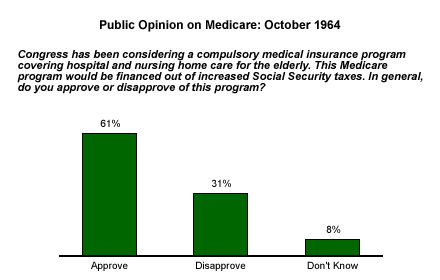Although new plans for revitalizing America's healthcare system seem to be appearing on a weekly basis lately -- Democratic presidential hopefuls Howard Dean and John Kerry unveiled their plans two weeks ago and Joseph Lieberman revealed his last week -- many of the proposed solutions may sound like variations on old themes. The debate over whether to privatize Medicare, for example, started more than 40 years ago, before the program even existed. Gallup's historical data paint a portrait of a public politically divided on this issue -- a portrait that doesn't look all that different today.
Although the Medicare program was not signed into law until 1965 during Lyndon B. Johnson's presidency, the roots for the idea of Social Security tax-funded healthcare coverage for elderly Americans can be traced back to the Truman administration. The idea continued to gain momentum during the Kennedy administration. In 1962, during his State of the Union address, John F. Kennedy reiterated his plan for "a Social Security system of health insurance for the aged."
In March 1962, Gallup asked Americans about Kennedy's plan: "Two different plans are being discussed in Washington for meeting hospital costs for older persons: One plan would let each individual decide whether to join Blue Cross or buy some form of voluntary health insurance. The other plan would cover persons on Social Security and would be paid by increasing the Social Security tax deducted from pay checks. Which of these two plans would you prefer?" At that time, a majority of Americans, 55%, preferred the Social Security approach, 34% preferred the private insurance approach, and 11% were undecided.
Further analysis by respondents' political identification reveals some interesting, yet unsurprising results considering today's political division on this issue. In 1962, a clear majority of Democrats, 65%, preferred the Social Security approach, while a majority of Republicans (52%) said they preferred the private insurance approach. Political independents' preferences were closer to those of Democrats, with 56% preferring the Social Security approach.
When Gallup asked this question two more times that year, including once after Medicare's defeat in the Senate, support for the Social Security approach had waned. By late May, more Americans still preferred the Social Security approach, but by a slimmer margin: 48% preferred it, and 41% preferred private insurance. By August, after Medicare's defeat, the margin had narrowed even further: 44% preferred the Social Security approach, and 40% preferred private insurance. These declines occurred along party lines as well, but majority support for Social Security held among Democrats, and support among Republicans and independents for the private option grew.
In July 1964, the Senate Special Aging, Health of the Elderly Subcommittee released a report titled "Blue Cross and Private Health Insurance Coverage of Older Americans." The subcommittee reported that it felt private health insurance "was unable to provide the large majority of older Americans with ‘adequate hospital protection at reasonable premium cost.'"*
In a survey from October 1964, sponsored by Potomac Associates, Gallup asked Americans the following question: "Congress has been considering a compulsory medical insurance program covering hospital and nursing home care for the elderly. This Medicare program would be financed out of increased Social Security taxes. In general, do you approve or disapprove of this program?" Sixty-one percent of Americans approved, 31% disapproved, and 8% didn't know. A Gallup Poll conducted that same month found similar results, with 57% approving and 31% disapproving. Less than a year later, President Johnson signed the Medicare program into law, with former President Harry S. Truman at his side.

Bottom Line
As the 2004 presidential election campaigns continue to gear up, new healthcare plans will surely be offered (not all of the Democratic candidates have issued theirs yet). Republicans will most likely continue to espouse the values of a reformed Medicare with qualities similar to private insurance, and Democrats will offer their own versions with varying combinations and private and government-controlled elements. Neither perspective is by any means new, but in the face of an impending Medicare disaster, it seems more important than ever that the American public is provided with a competitive market of ideas in order to arrive at the best solution.
*From History of Medicare and Medicaid, Centers for Medicare and Medicaid Services